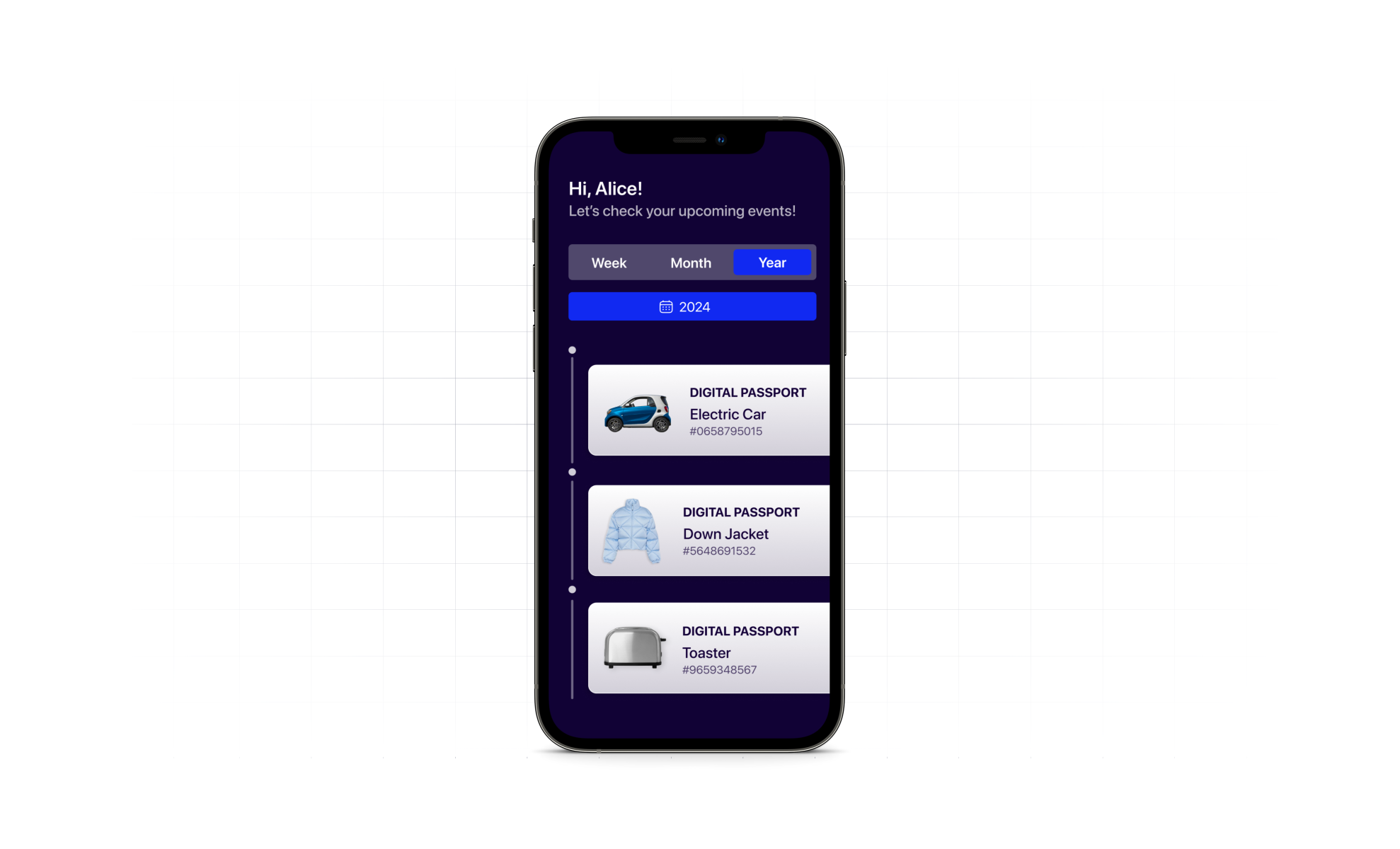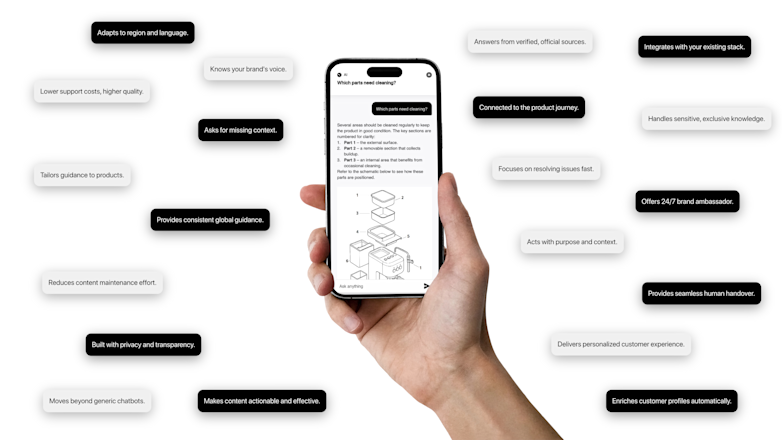
Striding towards a future that is as sustainable as it is digital, the European Commission has forged an innovative tool: the Digital Product Passport (DPP).
Rooted in the audacious ambitions of the European Green Deal, the transformative initiative presents a sophisticated blend of technology and sustainability.
At its core, DPP uses blockchain technology to decode the lifecycle of products across various industries. Its leading innovation towards a sustainable future by helping consumers make enlightened decisions. With a fresh legislative mandate, the DPP catalogs information from product origin to its end life.
DPPs are a game-changer in supply chain transparency and sustainability efforts. Their impact is far-reaching, from the textiles industry to construction or the electric vehicle industry. That’s especially relevant given the European Union's ambitious sustainability goals as part of their European Green Deal.
Why should you care? DPP legislation can significantly impact your business in the consumer goods industry. It's a crucial part of the EU's push for a circular economy, aiming to reduce CO2 emissions and improve resource efficiency.
Our goal in this post is to break down the legislative essentials of DPP. We’ll cover everything, from what changes to expect to how it will impact different sectors.
We'll also share a detailed timeline for adopting DPP so that you can stay ahead of the curve. DPPs are no longer just a theory. We're here to give you practical insights to navigate the DPP landscape effectively.
What is the digital product passport (DPP)?
The Digital Product Passport (DPP) is a digital platform that gathers and shares information about a product throughout its lifecycle. It's a tool designed to enhance transparency, environmental impact assessment, and foster sustainable practices.
Here’s the concept of DPPs summarized in four key points:
Data collection: The DPP collects all essential data related to a product's supply chain and lifecycle.
Traceability: The DPP assigns each product a unique identifier compliant with ISO/IEC 15459:2015.
Transparency: Access to DPP information is regulated, ensuring data security and privacy.
Sustainability: It supports circular business models and provides details on material sourcing, carbon footprint, recycled materials, durability, and recycling guidelines.

The EU's vision for a circular economy and the role of DPP
The European Commission introduced the Digital Product Passport (DPP) to foster sustainability and facilitate the transition to a circular economy. The DPP aligns with the European Green Deal, providing a framework for sharing comprehensive product information across the value chain, which includes data on raw materials, production, and recycling processes.
The "product passport EU" is the tool through which the EU intends to transition to a circular economy. The "consumer goods companies legislation" refers to various EU laws and regulations directly impacting consumer goods companies.
The DPP is one of these critical pieces of legislation, offering a digital platform for data transparency and helping companies demonstrate their commitment to sustainability. The DPP is a critical tool to tackle various challenges towards a sustainable economy. These challenges include:
Improving sustainable production and consumption
Enhancing traceability
Supply chain visibility
Validating compliance with environmental regulations
Promoting informed consumer choices
DPPs aim to address data protection, build business cases for sustainability, and support small and medium-sized enterprises.
Benefits for consumer good companies and the environment
DPP offers a plethora of benefits to consumer goods companies and the environment. Supply chains' enhanced visibility and traceability allow businesses to:
Make accurate sustainability claims
Improve their environmental performance
Gain a competitive edge
For consumers, DPPs provide access to detailed product information. They enable consumers to make informed purchasing decisions and promote repair and recycling practices.
At a larger scale, DPPs reduce emissions and waste, creating jobs. These advantages mark a significant step toward environmental preservation.
Data categories in the digital product passport
DPPs are pivotal in facilitating a circular economy and promoting sustainability by consolidating and providing valuable information across the product's lifecycle. It is a comprehensive product data record that helps make eco-friendly choices and extends product lifespans.
Key categories of data to be included in the DPP are:
Materials: Detailed information about the materials used in a product.
Repairs: Historical data related to product repairs.
Maintenance: Specific guidelines on how to maintain a product.
Recycling guidelines: Information about how to recycle a product effectively.
These digital passports are central in uniting fragmented product data from various stakeholders, making valuable information readily accessible to consumers, and ensuring inclusivity for small economic players in the circular economy. These passports can serve as a cornerstone in transitioning to a sustainable and circular economy.
Why are these data categories important?
These data categories are crucial for multiple stakeholders, including consumers, manufacturers, and policymakers:
Increased transparency: Transparency about product components helps consumers make informed decisions, combat greenwashing, and contribute to efficient waste management.
Consumer empowerment: Knowledge of repairs and maintenance aids customers in extending the lifespan of a product, reducing overall consumption.
Promoting durability and repairability: Manufacturers can understand and enhance the durability and repairability of products, driving sustainability.
Policy and regulation compliance: Policymakers can rely on the DPP for tracking and ensuring compliance with regulations such as the EU Battery Regulation.
The EU Product Passport and DPP are initiatives to address global climate challenges and facilitate reliable information sharing about product content, reuse, and recycling.
For instance, the EU Battery Regulation intends to establish a battery passport with unique identifiers and comprehensive battery data.
Platforms like Layerise offer services that simplify the digital onboarding process for products. We also help companies prolong product life cycles and reduce consumption by replacing paper-based user guides with digital solutions.
Impact of DPP legislation on industries
The DPP is a transformative legislation proposed by the European Union, designed to promote transparency and circularity in supply chains across industries. The DPP legislation has far-reaching implications, especially for consumer goods companies.
It is instrumental in their operations, facilitating the transition to sustainable practices and providing comprehensive product information, thus influencing informed consumer decisions.
DPP’s Impact on consumer good companies
The DPP legislation is relevant to consumer goods companies on multiple fronts. It mandates digitally recording critical product information such as:
Raw materials
Production
Repairs
Maintenance
Recycling instructions.
Consequently, it promotes a more transparent and efficient supply chain. It also helps companies align their strategies with emerging consumer trends valuing sustainability and transparency.
Role of DPP in operations:
In terms of operations, the DPP assists consumer goods companies by:
Enhancing supply chain visibility.
Encouraging the adoption of sustainable and circular business models.
Enabling selective sharing of sensitive data using zero-knowledge proofs.
The DPP serves as a tool for compliance and sustainability, helping companies become pioneers in sustainable practices.
The DPP legislation significantly impacts various industries, especially consumer goods companies. It’s designed to enhance transparency, promote sustainability, and enable companies to adapt to modern consumers' demands. As such, its integration into business operations is becoming increasingly critical for success in the current commercial landscape.
Adoption timeline of the digital product passport (DPP)
Adopting the Digital Product Passport (DPP) presents a complex yet crucial task for industries to remain aligned with the European Union's push for sustainability and a circular economy.
The process requires a detailed understanding of the DPP's inherent rules, the legislation enforcement timeline, and how adopting these innovative solutions aligns with the broader roadmap for a sustainable and eco-friendly future.
DPP rules and their impact on the adoption timeline
The DPP rules are more than regulations that must be adhered to. They represent a paradigm shift in how industries view product life cycles and consumer information. The implications of these rules on the adoption timeline are profound and multifaceted.
Creation of DPPs
The initiation phase of DPP adoption involves creating a digital identity for each product. This identity is a composite of the product's entire lifecycle, from its material composition and manufacturing process to its usage and end-of-life disposal. These initial steps require considerable time and resources, especially for industries extensivelarge and varied product portfolios.
Information requirements
A crucial aspect of the DPP rules is the stringent requirements for the type and quality of information in the digital passport. Ensuring a high accuracy and comprehensiveness of data might require new information collection systems or upgrading existing ones. The adoption timeline can be significantly affected by that.
Access to information
Balancing the need for transparency with privacy and security considerations forms a core part of the DPP rules. It implies the creation of secure yet accessible digital platforms where consumers and other stakeholders can access relevant product information. The time needed to develop and test these platforms is a significant factor in the adoption timeline.
Timeline for DPP legislation enforcement
Understanding the timeline for enforcing DPP legislation requires an in-depth look into its multiple phases. Each phase is a significant milestone on the road to full DPP implementation.
Phase 1 - Introduction of DPP legislation: This phase represents the first step on the journey to DPP implementation. It includes drafting the DPP legislation. The EU and relevant stakeholders engage in discussions to ensure the proposed rules are feasible and beneficial. The duration is uncertain and can vary based on the complexity of the legislation and the level of agreement among stakeholders.
Phase 2 - Approval and implementation: Once the DPP legislation has been drafted and agreed upon, it must be approved by the appropriate governing bodies. Following approval, the implementation of the DPP rules begins. The timeline depends on the legislation's complexity, the industries' readiness to adopt DPP, and the speed at which the necessary technological infrastructure can be deployed.
Phase 3 - Monitoring and compliance: The final phase ensures industries comply with the DPP rules. Relevant authorities monitor compliance, and penalties may be imposed for non-compliance.
This phase continues indefinitely, with the potential for legislation updates based on industry feedback and technological advancements.
The DPP adoption timeline in the broader DPP roadmap
Alignment with the broader DPP roadmap is fundamental to DPP’s effectiveness. It involves several key steps, each crucial in ensuring a smooth transition to DPP compliance.
Policy alignment: Companies must revise or develop new policies to ensure alignment with DPP legislation. That includes changes in procurement policies, product design principles, and customer information management systems.
Resource allocation: Successful DPP adoption requires significant resource allocation. Companies must allocate a budget for the technological infrastructure necessary for DPP implementation. Also, personnel must be trained to manage and operate the new systems.
Stakeholder engagement: Stakeholder engagement is a vital aspect of the DPP roadmap. Regular communication with customers, suppliers, regulators, and other stakeholders helps ensure a smooth transition to DPP compliance.
Continuous improvement: As the DPP legislation evolves and new technologies emerge, companies must remain adaptable and continuously improve their DPP implementation strategies.
Deadlines and conditions for industries in the DPP adoption timeline
DPP adoption involves different timelines and conditions for each industry, and understanding these unique requirements is essential for successful DPP compliance. Below, we explore the specific conditions and deadlines for DPP compliance in several key industries.
1. Electronics and ICT sector
The EU has set a deadline of 2024 for companies in the electronics and ICT sector to adopt DPP.
The digital passports for electronic products must include detailed information about any hazardous substances used, the product's performance metrics, and instructions for safe disposal or recycling.
2. Battery industry
Under the EU Battery Regulation, all batteries must be assigned unique digital identities by mid-2024. These digital passports must contain accurate information about any hazardous substances used, the battery's performance metrics, and responsible sourcing practices.
3. Automotive sector
Companies in the automotive industry are expected to adopt DPP by 2025. The DPP for transport, or the digital vehicle passports must contain detailed information about the materials used, the car's performance metrics, and end-of-life recycling possibilities.
4. Textile industry
The textile sector has until 2026 to adopt DPP. The digital passports for textile products must include detailed information about the materials used, potential allergens, and end-of-life management instructions.
Navigating the path to DPP compliance is a complex process that requires strategic planning and dedicated resources. A deep understanding of DPP rules, timelines, and industry-specific requirements can facilitate implementation.
While the journey may be challenging, the potential benefits of improved sustainability and greater consumer transparency make it a worthwhile endeavor.
A leap toward a more sustainable economy
The European Commission's Digital Product Passport (DPP) initiates a transformative shift towards a more sustainable, circular economy. Industries must offer greater transparency about their product's lifecycle, from production to disposal.
Introducing the Digital Product Passport (DPP) will usher in the following fundamental changes in industry operations:
Centralized information access: Businesses will centralize details about materials, repairs, maintenance, and recycling processes for their products.
Product longevity: To comply with DPP legislation, industries will extend product lifespans.
Digital shift: Companies will leverage digital solutions like those provided by Layerise to reduce paper consumption and offer better customer support.
The DPP paves the way for responsible consumer decisions, waste, pollution reduction, and enhanced value chain benefits. Companies adapting to these changes will stay competitive, attract conscious consumers, and contribute significantly towards a sustainable future.

Ready to embrace the future with Layerise?
The significance of the DPP legislation cannot be understated. It aims to revolutionize our digital lives, offering enhanced information access, privacy protection for consumers, and a uniform guide for businesses to comply with. As we anticipate imminent changes in legislation, it's essential to remain informed.
The right platform can help your brand prepare for new regulations, comprehend the impact of evolving legislation, and adjust strategies accordingly. The implications of DPP legislation will resonate through the EU and beyond, shaping the future of digital product management.
With Layerise, it is easy to revolutionize your customer’s journey and experience with your brand. We offer seamless onboarding, personalized user guides, and increased product engagement for all our clients. Unlock these benefits today and set your business on the path to customer success, the digital way!
Learn how to collect valuable insights on your customers to sell even more.

How to Turn a New Obligation into a Growth with Layerise

A trusted, brand-safe AI assistant that knows your products, your customers and your content.



